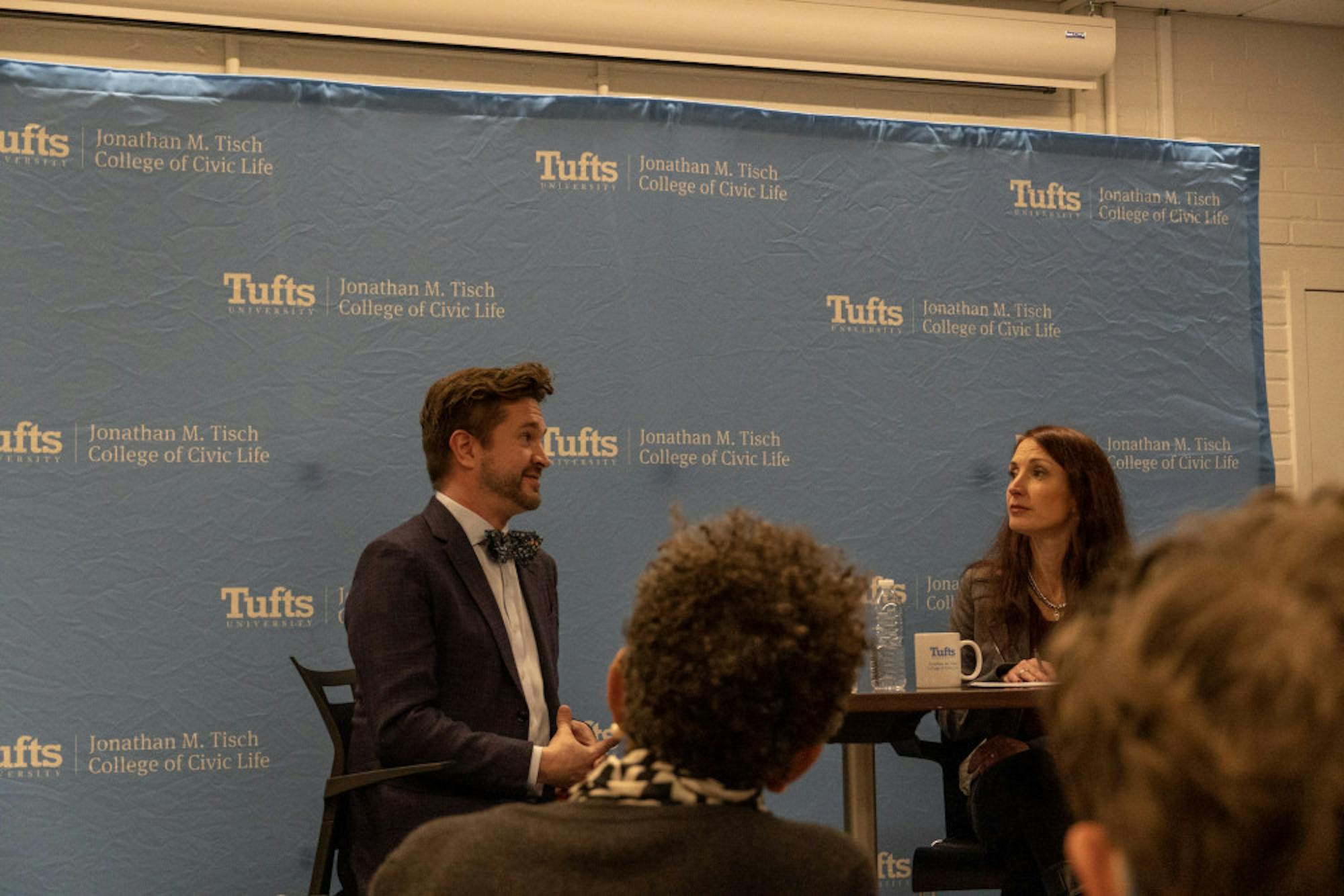Mitchell Lunn (LA’04), an associate professor of nephrology, epidemiology and population health at Stanford University School of Medicine, received Jonathan M. Tisch College of Civic Life’s 2023 Lyon and Bendheim Citizenship Award in Barnum Hall on March 7 for his work in representing sexual and gender minority populations in healthcare.
Following the presentation of the award by Dayna Cunningham, dean of Tisch College, Lunn spoke about his career and accomplishments with Jennifer Greer-Morrisey, the civic life program manager for Tufts’ graduate health sciences schools.
Lunn spoke about the healthcare disparities within LGBTQ+ and sexual and gender minority populations. He attributed these inequalities to important studies and surveys, including the U.S. census, neglecting to ask participants about their sexual orientation and gender identity.
“If we look at a study of 10,000 people with diabetes, [it is] guaranteed there are LGBTQ+ people in that study,” he said. “Are they visible in the results? Absolutely not. And so it makes it really, really hard to start looking at some of the underlying reasons or underlying aspects in their lives that may or may not have contributed to whatever condition is being studied.”
Lunn is also the co-director of the PRIDE study — the title is an acronym for Population Research in Identity and Disparities for Equality. It is the first national longitudinal study for adults that identify as members of the LGBTQ+ community. The study has over 24,000 participants from across the country.
“The biggest thing that [the participants] do every year is an annual questionnaire. It’s quite substantial; it takes about 45 minutes to an hour to complete,” Lunn said. “But we also deploy surveys that are made shorter but are more in-depth on a particular topic.”
He is also the co-director of PRIDEnet, a series of digital and in-person networks of sexual and gender minority community members and nonprofit organizations across the country that allow the study to reach a national audience.
During the discussion, Lunn spoke about his experience as an undergraduate student at Tufts studying biology and French. He was the first student coordinator of the Summer Scholars program, which he says spurred his interest in a career in research.
Lunn was also an extremely active member of the LGBT Center on Tufts’ campus.
“It was a place where I kind of came to terms with my own identity as a cisgender gay man,” he said. “Getting involved in civic life that was initially focused primarily on the Tufts campus and then getting my start in the tinglings of a research career, … all those things really began [at Tufts].”
While at Stanford University School of Medicine, Lunn and his colleague Dr. Juno Obedin-Maliver noticed that there was a lack of information surrounding LGBTQ+ health in their medical education. The two published a national study of LGBTQ+ medical education during their residency, which Lunn credited with the realization that his passions for research and advocacy could intersect.
Currently, Lunn is primarily an LGBTQ+ health researcher, but he sees patients with kidney disease for around six weeks every year and works as a primary care physician for LGBTQ+ patients one day per week. He spoke about changes in attitudes toward the LGBTQ+ community that he has witnessed while working in medicine.
“I would get very frustrated, for example, taking medical licensing exams,” he said. “It used to be where I could read ‘a 33-year-old gay man’ and I could stop reading the rest of the question and find a list of answer choices that either were HIV-related or HIV opportunistic infection related, and that was the correct answer.”
Greer-Morrisey opened the floor to audience questions, which included the influence of recent anti-LGBTQ+ political measures on Lunn’s research.
“It’s going to be very, very difficult, from the ‘Don’t Say Gay’ [law] in Florida to many other things being criminalized, [such as] providers being put in jail for providing gender-affirming care,” he said. “It will be important for all of us to vote, to advocate, to campaign, to spread awareness, all the things that we can do, even in states that are much more welcoming and affirming like Massachusetts and California.”
Lunn concluded the lecture by sharing his optimistic outlook on the future of LGBTQ+ rights.
“Now [that] people are paying attention, especially to transgender and non-binary people, [these laws are] coming across the desk of legislatures. We might not like what they’re doing, but they’re at least seeing it, which is actually a hopeful sign to me,” Lunn said. “We’ll get through it. The arc of justice is long.”






